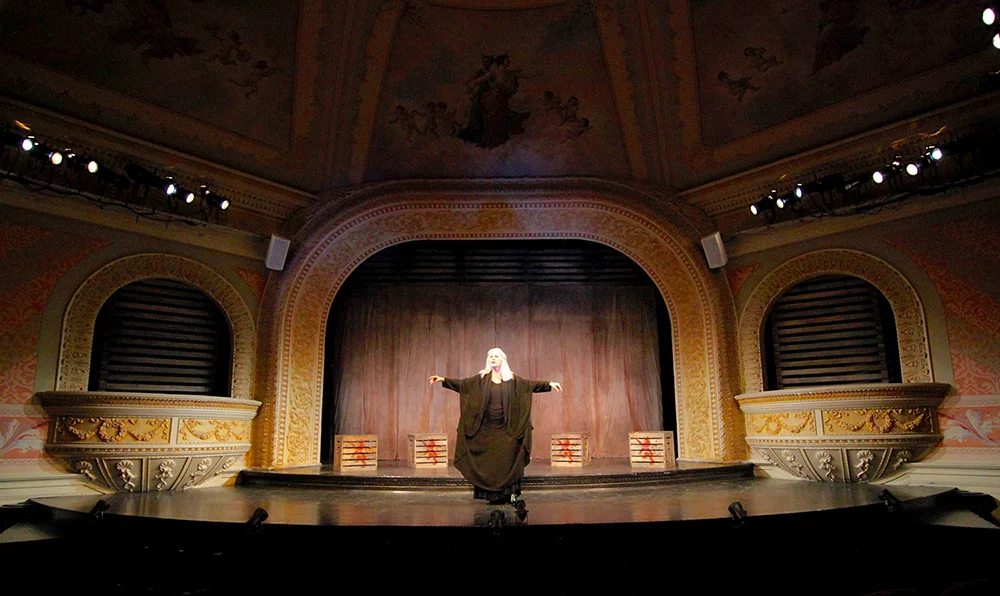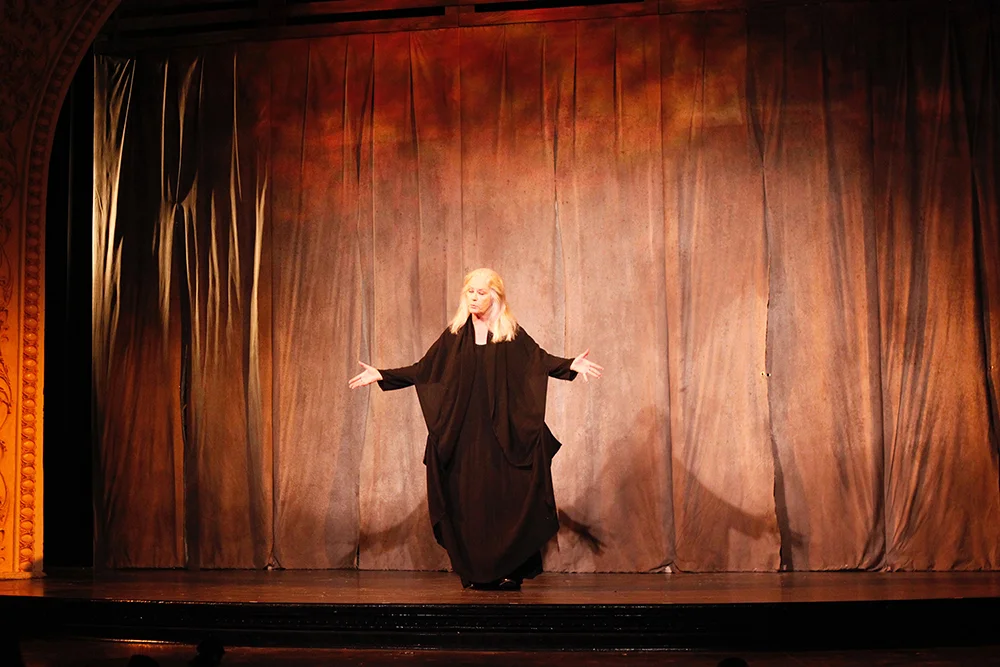Henry V
Theater at monmouth



















The Portland Phoenix
A RESTrAINED HENRY V: THEATER AT MONMOUTH DELIVERS NUANCED PRODUCTION
Shakespeare’s Henry V is a coming-of-age story – Henry, once known as Hal, the young regular of taverns and Falstaff, finally comes into manhood and kingship. But Henry V is also an overtly theatrical story about war, about both a battle (the Battle of Agincourt, near the end of England’s Hundred Years War with France) and battle itself. Mark Mineart directs a clarion, beautifully restrained, affecting production, at the Theater at Monmouth.
Henry V is a play less of action than of character, texture, and explicit story-making, and the elegant minimalism, concentrated jewel-tone colors, and physical understatement of Monmouth’s staging, which loves stillness and nuance, are powerful choices for what often feels as much lyric as epic. Before a simple, rough scrim and wood frame, often backlit in red or white, Theatrical illusions are openly acknowledged by our Chorus, the striking Janis Stevens. She narrates with scintillating tenderness – at once teller and conjurer.
As the man at the story’s center, a man on the cusp, Jake Loewenthal is exceptional. His Henry’s liminal state between scampish youth and resolute manhood is arrestingly drawn and utterly convincing; we can actually watch him processing Henry’s changes. With boyishly handsome features, his face moves seamlessly from devilishness to sober resolution to a sort of startled self-awareness of his own evolution. Watch his reaction to the taunting gift of tennis balls, how first his lips curl in impish smile, but soon his jaw is set in focused vehemence. Much later, watch him learn that the English have triumphed, when that set of his jaw finally loosens and quivers and, eyes wet, he finally registers the full impact of what it has taken to do battle.
We also understand battle through secondary characters, many of whom have squabbles with those on their own side. In this excellent ensemble, even the most glancing characters are vivid, fraught with poetic force, and sometimes very funny. As the Welsh captain Fluellen, who picks fights with the Irish captain MacMorris (Lucas Calzada), Chris Holt is marvelous, prickly and indignant; a clownish threesome lends comic relief as whimpering Bardolph (Mark Cartier) tries to resolve personal grievances between Pistol (Bill Van Horn) and Nym (James Hoban) – all once followers of Falstaff – so that they might fight as one. The French have their own in-fighting: One priceless scene shows the cool, laconic derision of Constable (Calzada) and Orleans (Rob Glauz) for the Dauphin (the fine Tim Kopacz, fastidiously, elegantly arrogant in blue), who unlike them will not see battle. And a fine ambivalence comes as the steely delivery of the French herald Montjoy softens infinitesimally with respect for Henry.
Throughout are scenes and glints of quiet theatrical luxury – Henry in crimson with gold lions; subdued but potent leather, mail, and armor. Light is especially beautiful; watch white explosions upstage as grey-bathed soldiers mid-stage kneel, breathing audibly, then rise one by one to Henry’s courage. Watch a quietly wrenching scene of low firelight and tall shadows when Henry, in disguise, listens to three soldiers who fight his war yet have no say in it.
Those foot soldiers are portrayed as sympathetically and with as much nuance as Henry, in the next scene, as he agonizes over what it means to hold power over them. Such subtlety is at the core of this arresting production, which looks with compassion upon many men’s struggle to find civility, humility, and humanity in battle. Monmouth’s production offers a breathtakingly poignant meditation on both those who must lead wars, and those who must fight them.
BroadwayWorld.com
BWW Review: A Little Touch of Harry in the Night: TAM Opens HENRY V
One of Shakespeare's best-loved history plays, Henry V, opened Friday July 23 at Maine's Theater at Monmouth in a stylish and stirring performance directed by Mark Mineart. Trimmed to a little over two hours, the production, nonetheless, keeps the architecture of the masterpiece and all the most famous speeches, and performed as it is by a strong ensemble, it achieves an immediacy and truthfulness.
Mineart's staging is lean and muscular, and, by virtue of necessity, doubles some of the characters and uses women in trouser roles to complete the ensemble of English and French soldiers and courtiers. The fight choreography by Leighton Samuels is vigorous and bold, suggesting a panoramic dimension. Mineart's touch is deft and restrained, so that none of the bravado or comedy is exaggerated; rather he asks the excellent cast to find the humanity in the characters.
Jake Loewenthal is an admirable and appealing King Harry. This is a young king whose wild exploits are not that far behind him, but who has clearly grown wiser and more temperate by wearing the crown. Loewenthal conveys the King's compassion and his core of moral strength, made all the more sympathetic by the very vulnerability which underlies them. He possesses a quiet fire for the battle speeches, delivering "Once more unto the breach" with conviction and courage and the St. Crispin's Day rally as much an effort to inspire his troops as to steel his own resolve. But perhaps his finest moments come in the scene before the battle when Harry in disguise wanders among his men taking the temperature of their feelings and fears. Moreover, he offers a charming comic spirit as an awkward soldier forced to play the suitor in the final scene with the French princess.
Janis Stevens lends an elegant presence and rich diction to the Chorus, shaping her famous prologue and other monologues with a sense of wonder and transport. She also brings a warm, earthiness to the Hostess and an endearing wit to Alice, Katharine's lady-in-waiting. James Hoban offers some nice acting contrasts as a dignified French King, a stalwart Westmoreland, and an amusing Corporal Nym. His other two comic cohorts, Christopher Holt as the loquacious Welshman Fluellen (sporting a note-perfect accent) and Bill Van Horn as a rustic, plainspoken Pistol handle their scenes with flair. Mark Cartier creates a quartet of nobles, turning in an especially deft account of the Archbishop of Canterbury. Tim Kopacz appropriately plays the Dauphin with pompous egotism, while Erica Murphy gives the French herald Montjoy a noble dignity, and Chris White is an imposing, velvet voiced Exeter. Kelsey Burke limns a spirited Katharine; her sense of timing, command of French, and humorous mangling of the English tongue give substance and charm to her two scenes. Rounding out the ensemble nicely are Michael Dolan as a touching boy soldier, Joe Mariani, Rob Glauz, Blythe Coons, Lucas Calzada, and Isabella Etro in a series of supporting roles.
Brittany Vasta's spare stage design constructed of slatted panels and muslin curtains, evokes the unvarnished strength of this martial tale, while Jason Fok's atmospheric lighting transforms the stage from the glitter of court to the flicking firelight of the camp on the eve of the battle. Kathleen Payton Brown's costumes constructed in richly textured fabrics and striking colors artfully distinguish English from French and lend the otherwise simple production an air of elegant substance. Rew Tippin handles the sound balance effectively and supplies the period fanfares and transition music.
Shakespeare's Henry V's appeal as a character is in the combination of youthful, sometimes brash courage with an inner strength and emerging wisdom and compassion. TAM's latest production gives the audience an honest engaging portrait of a boy's becoming a man, and of a man's discovering the meaning of true kingship.
Director's Notes
One reason I adore this play is because it is unapologetically theatrical, and declares its theatricality in its very first words. There was no ‘fourth wall’ in Shakespeare’s day and actors walked the boards playing to, for, and with their audiences freely and frankly. There is a tremendous power in this. But the chief reason I get excited about this play is because it asks and answers the fundamental question of what it takes to have great theatre happen. Many contemporary actors can become wrapped up in ‘being real’ and ‘feeling it’, and making things ‘believable.’ These are concerns that no actor in Shakespeare’s day would ever have entertained. They knew it wasn’t real, they knew the audiences knew it wasn’t real, and they knew the audiences knew they knew it. The goal isn’t to get audiences to believe what is happening on stage, the goal is to get audiences to help create what is happening on stage. And no where is this more clearly put forward than in the opening chorus of Henry V. The Chorus enjoins the audience to let the actors on their “imaginary forces work,” and goes further saying, “Think, when we talk of horses, that you see them,” and requesting that audiences “Into a thousand parts divide one man,” so as to populate the armies of England and of France, declaring that, “it is your thoughts that now must deck our kings/ Carry them here and there, jumping o’er times/ Turing the accomplishments of many years/ Into an hour glass.”
This is not an actor boasting, “we will make it so real for you that you’ll forget where you are,” this is the Chorus making the fundamental agreement with the audience that lies at the heart of all great theatre, “We are here together, making this story together, and without your imagination and participation all of what we actors do can come but to nothing.”
You, as the audience, are the final character and actor in our play. The one we have never met nor gotten to rehearse with. And tonight we will all finally get the chance to play together.
Nothing you see tonight will fool you into thinking you are at the English court or on the battlefield of Agincourt. We are hoping that our work on the stage will open a door for your imagination to walk through, creating between us something powerful and personal and unique to this group of people on this night and in this place.
Thank you for coming and enjoy the show!